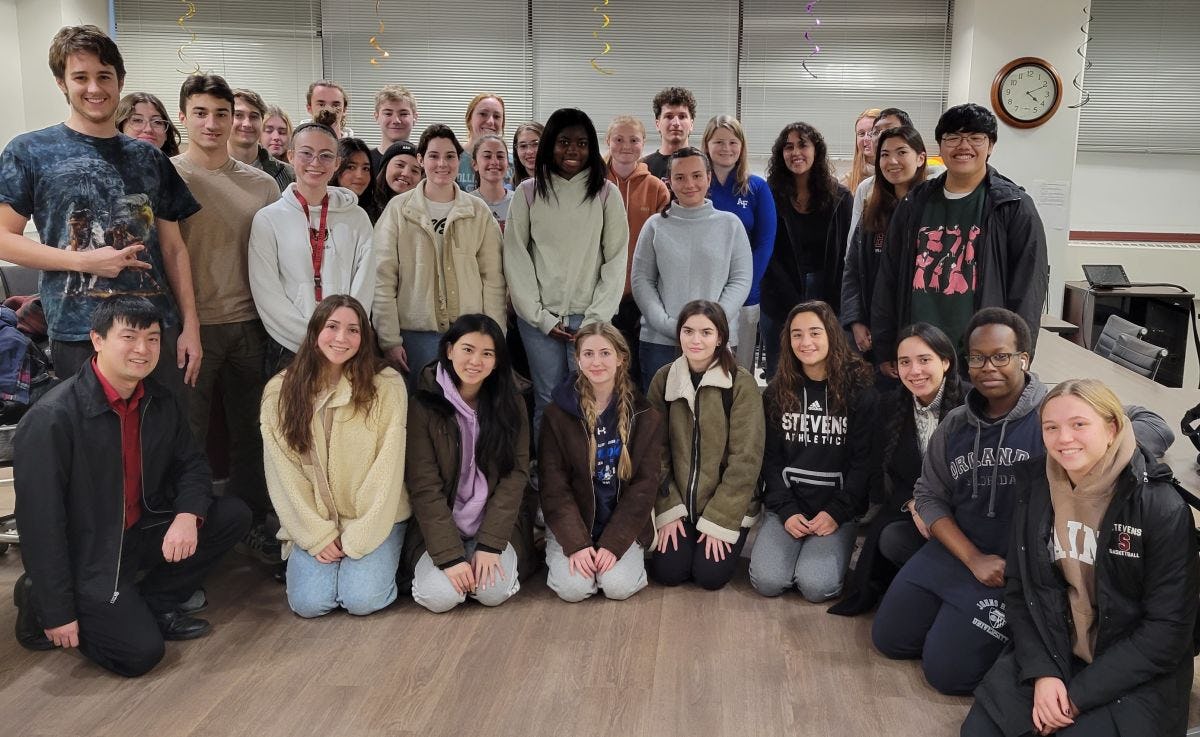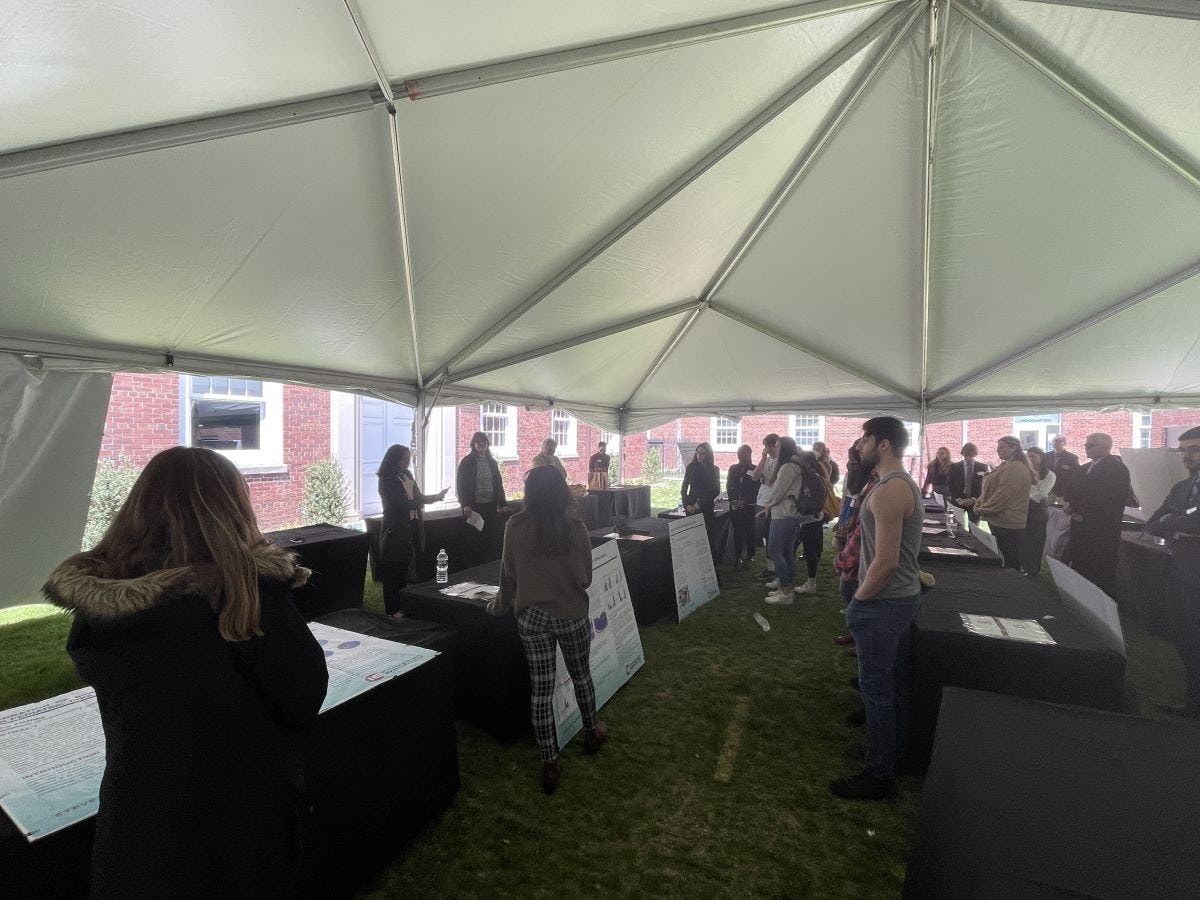First-Year Seminar is ‘Day One’ to a Lifetime of Student Learning
New Course Offering will Kickstart a Cycle of Learning and Doing for The Department of Chemistry and Chemical Biology
Stevens has been a pioneering force at the intersection between chemistry and biology for decades as one of the first universities to offer undergraduate degrees in chemical biology. Today, the Department of Chemistry and Chemical Biology intends to continue this legacy by becoming a bridge between the fields of science, engineering and medicine. This is the vision of the department’s 2021 Strategic Plan, which features strategic goals to empower faculty, and engage students.
Offering degrees in chemistry, chemical biology and biology, the tight-knit and impactful department has expanded both in size and scope, working to integrate the cutting edge research of renowned faculty in molecular, cellular and computational research to prepare students for the jobs of the future in fields such as drug discovery, precision medicine and sustainability.
Integral to this effort this fall has been the development of CH179: Career Pathways in Biological and Chemical Sciences. This semester-long seminar for first-year students is meant as an introduction to all that a chemistry or chemical biology degree can offer, both during students' coursework and beyond graduation as they enter their career.
The course was the brainchild of department chair Woo Lee, who has been making great strides to advance the department since his appointment two years ago. One of those initiatives was the retooling of the core curriculum to focus heavily on research skills – called the research spine. Lee saw the career pathways course as a catalyst to connect to the research spine making up the core of the curriculum.
In addition, the research spine consists of a research seminar, an ethics class, and research proposals course students take through their first few years at Stevens and culminates with the capstone senior research course their final year.
Lee tapped Jeffrey Lam, academic advisor for the department, to put the course together with the help of Kenny Wong, a teaching associate professor and associate chair for graduate studies, and Patricia Muisener, teaching professor and associate chair for undergraduate studies. Lam used his undergraduate degree in chemistry as well as his masters in higher education as inspiration for imaging all the different paths a student can take when they receive a degree.
Not Just for Doctors
The class is structured as a series of guest lectures from people working in fields related to chemistry, chemical biology and biology. Some examples of professionals the students engaged with in this semester’s course were Executive Director of the Screening & Compound Profiling Department at Merck & Co Adam Weinglass, and William Rappa, an analytical chemist with L’Oreal – fields more traditionally associated with chemistry and chemical biology degrees.
Additionally, however, students heard from Marina Ostankovitch, a senior journal publishing manager at Wiley, who spoke to the students about science writing, and Jordyn Perdon, a senior field environmental specialist for Amtrak, who spoke about environmental careers.
“It seems a lot of students feel that they are gearing towards a healthcare field - something Stevens is excited for them to pursue but only if that is their passion- “and if they want to pursue something else they are not sure where to turn to,” said Lam. He hopes that the diverse array of guest speakers will show first year students just how versatile a chemistry or chemical biology degree can be. This is meant as a source of motivation for the students for their research interests throughout their time at Stevens.
Some of the guest speakers for the seminar are young alumni of the department, which is something of particular excitement to Lee, who envisions this as an opportunity to enhance a positive feedback loop of students giving back to Stevens through their time and experience as alumni.
One alumnus who met with the seminar attendees this semester was Joshua Ross, currently a fourth year dual degree (MD,MBA) medical student at New York University (NYU) Grossman School of Medicine and NYU Stern School of Business. “Stevens is a small community, and I want to be part of the alumni that gives back,” Ross said. “Being part of the department seminar series is just one way for me to do that.
Ross found the experience of speaking to the first-year students rewarding. “I am always happy to mentor any students interested in medical school, as those older than me did, and connect those who are interested in areas that my friends are currently working in with them. I just want to show the students that their dreams are possible and help give them a roadmap so early on the steps that they need to take to make them happen.”
First-year student Victoria Yashchuk appreciated how each week focused on a different career path. “You learn something new with each speaker,” she said.
Sarah Gesiselhart is not currently considering medical school and thought before the class that research was her only other career option. “[The speakers] are doing all kinds of different things and now I am looking at them too,” she said. “And I think other kids are going to be looking into those opportunities also.”
First year student Cara Leonard had only really thought about the pharmaceutical industry as a career path before the course, but now talked about the “expansiveness” of the fields of chemistry and chemical biology. “It has definitely given me insight into different opportunities within [the field].”
“Looking ahead, I am so proud to be a part of [the seminar series],” said Lam. “This really is one of the proudest accomplishments in my professional career. I hope it is a model that other departments or even other colleges could learn and adapt from.” He believes it is an opportunity to give students the chance to “think holistically about their academic plans and the careers that come out of it.”
Going Beyond Year One
During their first few years immersed in the research spine, students are encouraged to think long-term about what they could achieve. In their senior year, during the senior capstone research course, they demonstrate what they have learned by participating in year-long molecular, cellular and/or computational focused research experiences in collaboration with professors or industry contacts, which plays an important role in student development.
These individual and group research projects are highlighted at Stevens Annual Innovation Expo, the yearly showcase for student design, innovation and entrepreneurship, as well as at the dovetailing department Research Day. Here, the cycle of continuous engagement is evident, as this past year saw department alumni Steve Cornwell and Nicholas Murgolo as project judges for the Research Day competition.
Muisener emphasized that alumni and student input is critical as undergraduate education in the department evolves. An annual exit and placement survey for seniors was implemented for the first time this past spring, which allows the department to better track the career direction of graduates. The undergraduate education committee also used the survey results to update and modify the curriculum to focus on three distinguishing features: the research spine, technology emphasis and contemporary societal context. Muisener notes “The Undergraduate Student Advisory Board, which has become very active with dedicated student board members, allows the department to obtain input and feedback in real time in order to make improvements and better serve our students.”
In addition to his work with the career pathways course, Wong has been working to develop the accelerated master’s program (AMP) at the department level and is excited about the prospects alumni have for this higher-education cycle.
“I see two major impacts in our undergraduate students, one is as an AMP student where they can contribute as course assistants for our undergraduate courses while getting a master’s degree in chemistry or chemical biology,” explained Wong. “During year five they have an impact on student learning while finishing a master’s degree as a springboard to their specific career path. This is a win-win situation for them, our undergraduate students, and our undergraduate and graduate programs. It builds our community of learners in a very exciting and positive way. In this model, the alumni become stakeholders to the continued success of students – the feedback loop – and a conduit for the future career success once they graduate, which is the prospective output.”
High School, Graduate School, and More
Staff and faculty have outlined other opportunities for growth and development that the department has been tenaciously pursuing. These include developing and enriching summer programs for students, including more opportunities for industry internships and clinical and research experiences. Additionally, work is being done to expand the Steven’s pipeline beyond the undergraduate experience with high school and graduate degree outreach.
The department’s strategic plan identified one main goal as educating and empowering tomorrow’s leaders by providing “broad foundation in chemical and biological sciences, critical hands-on laboratory skills, integrative research spine experience, and global societal perspectives.” The work thus far shows just how much they truly are aiming to live these ideals, for students today and forever.
As someone who came through Stevens as an undergraduate, became a member of the External Advisory Board, and continues to return to Stevens to give back, alumnus Ross summed it up well. “I've been firsthand seeing all of the hard work that the department is doing to make it a better experience for the students. Whether it be early exposure to career options and research, fighting to have the career center find internships for [our] students, or upgrading the laboratory equipment, I am confident that [the department] is heading in a great direction.”




